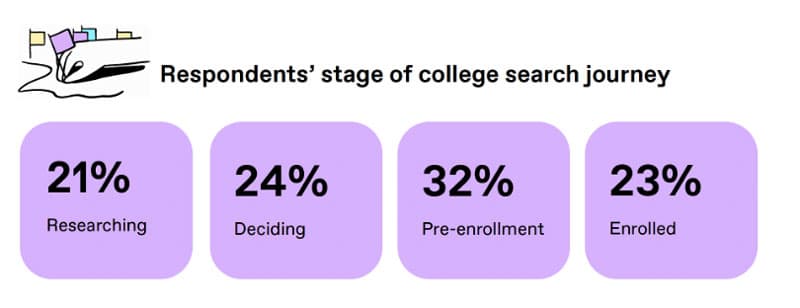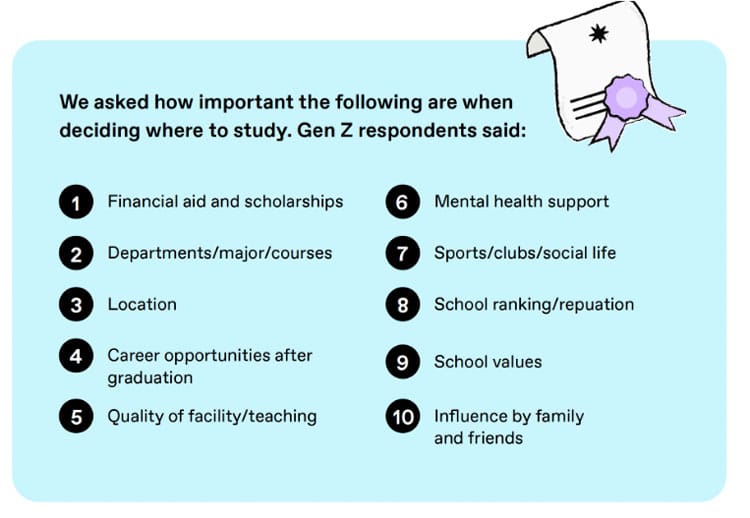Tracking the Gen Z student journey in planning for higher education
- A new research report underlines that universities and schools need to design their website so that it conveys the right “feel” to students and prioritises their top concerns
- It also makes clear that having a student ambassador programme is now essential to engaging prospective students
- Many students are using TikTok (or other social channels) as a search engine – not just turning to it for entertainment
A new report from peer-to-peer platform provider Unibuddy focuses on Gen Z students born between 1996 and 2010 and their approach to higher education – including how they search for colleges and universities. While the report focuses on students in the US, the themes in the report can be extrapolated and can shed light on what matters generally to college-bound students today.
The survey for the report was conducted among roughly 1,300 students in June 2022. Students were at various stages of the enrolment funnel.

Searching for real connection
An overarching theme in the report is that Gen Zers are “a generation whose decision-making is guided by emotional connection.” Rather than being impressed by corporate marketing, they value authenticity and are much more likely to be influenced by their peers – particularly those active in TikTok. The report emphasises the importance of personalising communications such as email and really connecting with students on their terms. Unibuddy notes,
“The challenge for universities is delivering this highly personal, authentic, and human experience at scale. More and more universities are turning to their brand evangelists—current students—to act as digital ambassadors. It’s proven to be a method that students report as helpful and one that universities report as an effective yield tool.”
While previous Unibuddy research indicates that most colleges are investing in digital marketing (67%), the edtech company points out that “it’s notable that a significant number of universities have an ‘offline-only’ [student] ambassador programme, despite the enormous growth in hybrid and virtual activity.”
A focus on the future and affordability
None of our readers will be surprised by the fact that nearly 4 in 10 students (37%) said that career opportunities are one of the top three considerations for them when they make choices about higher education. Nor are we shocked that the availability of financial aid and scholarships emerged as the top factor affecting students’ choice of institution.

As a result, Unibuddy advises universities to showcase the following in marketing:
- Graduate employment stats
- Cost, financial aid, and scholarship opportunities
- Majors/departments
Fears about not finding community
An important finding from the research is that students are quite concerned about not fitting in on campus and not making friends. Unibuddy then asked what could help assuage these fears and these were students’ top five suggestions:
- Ability to connect with fellow future students before arriving
- Ability to connect with current students to ask questions
- Ability to connect with professors before starting classes
- Additional information about campus life
- Access to more support from the school
An overwhelming 92% of students also told Unibuddy that that “speaking to current students is beneficial at some point in their [search] journey.”
These findings underline the key role that student ambassadors can play – including on social media – as well as the wisdom of presenting written/video testimonials on the institutional website. In addition, they indicate that investing in virtual tours and webinars for prospective students is a good bet for successful recruitment strategies.
In fact, when students were asked which is the best way for institutions to connect with them, “virtual events” was the third most cited channel after in-person events and email (but only personalised email – students indicated that they loathe generic email clearly sent to a massive database of their peers).
Keep an eye on that institutional website
Almost three-quarters (72%) of students said that checking out a college’s website was the first step in their research about where to study. While students not surprisingly said they explore majors offered and scholarships/financial aid, they also said that the tone of the website – its design, its ability to convey a warm and exciting personality – is something they look for:
“Students reported that they also judge the 'vibe' of a website and used this as a barometer to assess the personality of the school. Being on your website should mirror the experience of being on campus so students can truly get a feel for the school. This unique focus on the ‘feel’ of the website seems to be a differentiating factor for Gen Z.”
This finding leads to a certain conclusion: institutions should not let their website languish (e.g., not updating it with current information) and should reflect on whether the design and content is conveying an ideal brand – keeping in mind that a brand is really what its desired audience thinks about a company, product, service, or person.
Good questions to ask are:
- Is there enough space devoted to student testimonials, video, and graduate outcomes?
- Is the design modern and appealing?
- Is there a virtual tour readily available so students can “tour” the campus without having to visit in person?
Regular meetings to assess the performance and “vibe” of the website are crucial to being able to leverage this all-important channel.
TikTok and Instagram are now search engines
After the institutional website, social media channels are the second-most important channel for students exploring where they will study (55%). Unibuddy makes a crucial point here:
“More hours are [now] spent watching TikTok than Netflix. A presence there can truly elevate a university brand to a whole new audience … In fact, Google’s internal data—first reported by TechCrunch—reveals that Gen Z’s search habits are changing. When they want to find information, they don’t turn to Google. ‘Almost half’ instead use TikTok and Instagram as search engines.”
A TikTok presence requires serious consideration and strategy, it must be said. Students look for authenticity and whether a brand really gets how to use the platform and convey a cool personality. More and more universities are beginning to pay current students to be social media ambassadors for this very reason.
Student ambassadors can help across the enrolment funnel
Unibuddy research with institutional staff has found that 85% of admissions professionals said that the use of student-to-student communication improved engagement with prospective students. For their part, Gen Z students indicated that the times they would find it most helpful to talk to other students are:
- When they are narrowing down a list of schools to apply to
- When they are making a final decision
- At the research stage
- During the period between enrolment and orientation
- Writing applications
In other words, students want the ability to talk to other students pretty much all the way through their decision-making about higher education. Unibuddy concludes:
“Taking these lessons as a whole, it’s clear that there is a strategic undercurrent that flows through all of them. This is a generation that is crying out for tangible, personal connections and community.”
For additional background, please see:













